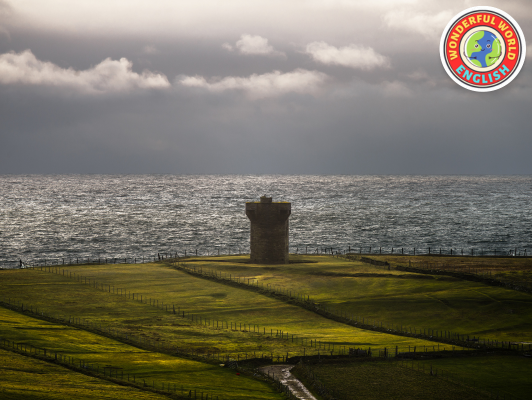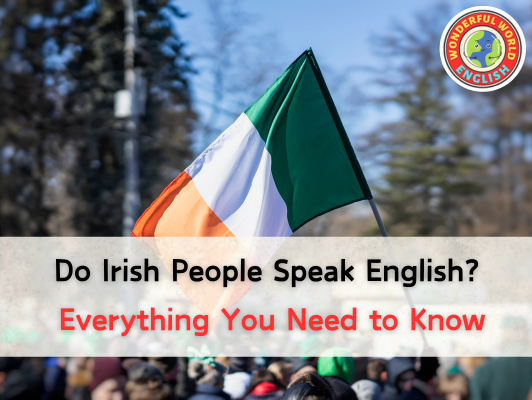Contents
Toggle
Meet David De’ Ath, founder, editor, and writer at Wonderful World English. With his extensive background as an English teacher, David provides valuable insights and practical tips on ESL for students and teachers alike.
In Ireland, the English language is widely spoken and understood.
It serves as the dominant language for the majority of the population, a status that has historical roots stretching back centuries.
The influence of English in Ireland can be traced to a series of historical events beginning with the Norman Invasion and extending through periods of colonization.
The Irish language, also known as Irish Gaelic, holds a place of cultural significance and is taught in schools throughout the country.
It experiences varying degrees of fluency among the population, but English remains the predominant mode of communication in both professional and daily life.
Within English usage in Ireland, there are distinctive cultural linguistic traits and regional dialects that add to the rich tapestry of languages on the island.
Key Takeaways
- English is the primary language spoken in Ireland.
- Irish Gaelic is culturally significant and preserved through education.
- Regional dialects of English in Ireland reflect unique linguistic traits.
Language Profile of Ireland
Ireland’s linguistic landscape has been distinctly shaped by historical events, and it exhibits a variety of languages, with English being widely spoken and Irish Gaelic holding a special status.
The country’s demographic and cultural dynamics further reflect the presence of other languages, influenced by its history and immigration.
Historical Evolution of Languages in Ireland
Ireland’s history is rich with linguistic changes. Initially dominated by Gaelic, the island experienced a significant linguistic shift following the Norman Invasion and subsequent British Rule.
Over centuries, English grew in dominance, but the Gaelic Revival movements sought to preserve the native Irish tongue.
Key efforts included promoting Irish Gaelic in schools and recognizing the Gaeltacht regions where Irish is used as a community language.
Prevalence and Geographic Distribution of English Speakers
English is the predominant language in both the Republic of Ireland and Northern Ireland.
According to the findings from the census, nearly the entire population speaks English.
The Gaeltacht areas, mainly located in coastal regions of the west, showcase a higher concentration of Irish speakers.
Here, English and Irish coexist, with English being the principal language of wider communication.
Status of Irish Gaelic as the National Language
Despite the prevalence of English, Irish Gaelic (or simply Irish) has been constitutionally recognized as the national language of the Republic of Ireland.
It is a mandatory subject in schools, and efforts are in place to bolster its use.
Additionally, Irish is one of the Celtic languages and has seen a resurgence in interest as part of cultural identity and national pride.
Influence of Other Languages and Immigrants
Ireland’s linguistic fabric also includes a thread of other languages brought by immigrants, including European Languages and languages from further afield, reflecting its increasingly multilingual society.
The influence of Ulster-Scots in parts of Northern Ireland, languages of the Irish Travellers like Shelta, and languages spoken by newer immigrant communities contribute to the linguistic diversity.
With each wave of migration, the assortment of languages spoken in Ireland expands, including those from Poland, Lithuania, Nigeria, and China.
You may be interested in the origins of English and the English speaking peoples.
Check out the guide below for more!
Related: History of the English-Speaking Peoples: A Chronicle

Cultural Linguistic Traits and Regional Dialects
The mosaic of Irish English captures the unique cultural and linguistic identity across regions, each variant richly textured with its own character and history.
The Rich Tapestry of Irish English
Irish English, or Hiberno-English, is distinctly influenced by the Irish language, culture, and the country’s historical chapters.
Ireland’s linguistic landscape weaves together the threads of its Gaelic past with the fabric of contemporary English Language influences.
For generations, the lexicon has evolved to incorporate elements of Middle English, while maintaining its distinct Irish Culture touch.
- Gaelic Roots: Echoes in syntax and vocabulary.
- English Influences: Adoptions and adaptions from American English and British English.
Characteristics of Regional Accents and Dialects
Accent and dialect vary significantly across Ireland, from the urban tones of Dublin to the melodies of Galway.
Ulster Scots speak with a different cadence, highlighting the diversity that exists even within this small island.
- Ulster: Marked rhoticity and a stronger influence from Scots English.
- Dublin: Non-rhotic with a distinct rhythm and quick delivery.
- Rural Areas: Express a retained authenticity, varying in discernibility.
Expressions and Idioms in Hiberno-English
Ireland’s English is alive with idioms and expressions unique to its culture.
Words like ‘craic,’ a term for good fun and entertainment, and ‘eejit,’ an affectionate term for a fool, enrich interactions.
These regional sayings are integral to Irish English and reflect the Irish way of life.
- “Having the craic”: Seeking out lively and enjoyable experiences.
- “Acting the maggot”: Behaving foolishly or joking around.
Impact of Language on Irish Identity and Society
Languages and accents often affect perceptions in society and can lead to stereotypes or discrimination based on pronunciation or word choice.
In Ireland, one’s accent can relay information about their roots, social background, and sometimes even politics.
Nevertheless, the diverse accents and dialects stand as a testament to the complexity of Irish Identity in a modern context.
- Accents as Social Indicators: Reflections on education level and geographic origin.
- Evolving Identity: The role of language in shaping modern Irish society.
We hope you find value in this information; you can contact us if you require any support.
Have a wonderful day!





